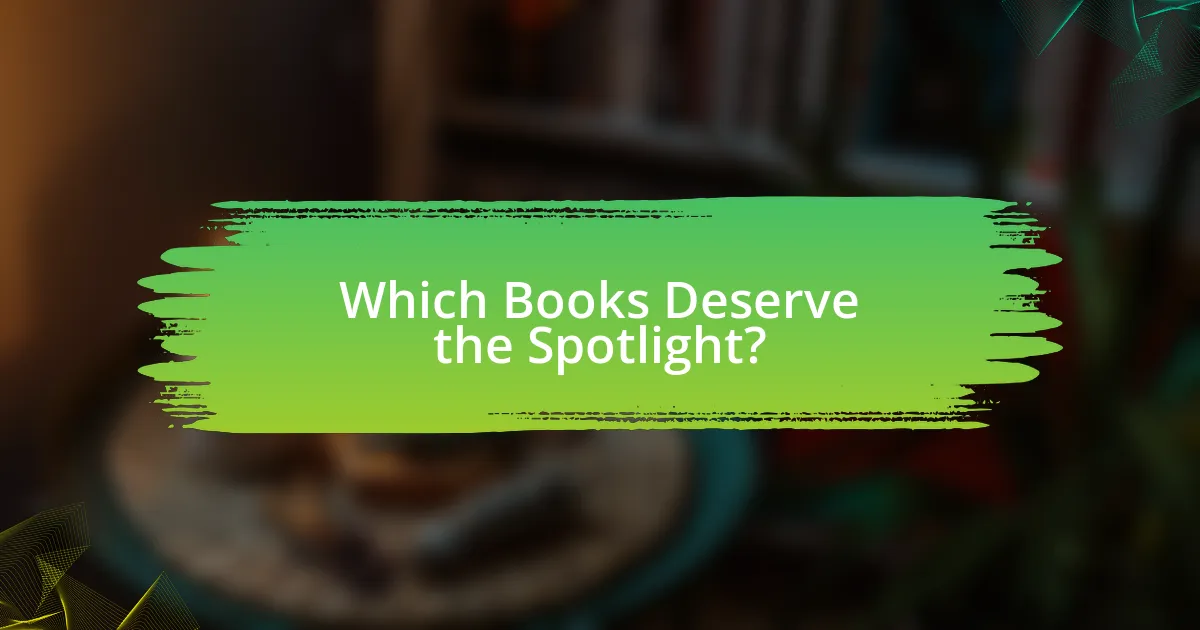Literary awards play a crucial role in recognizing exceptional writing, enhancing authors’ visibility, and influencing book sales and readership. They promote diversity by highlighting underrepresented voices and shaping cultural conversations around significant themes. The article examines the impact of literary awards on authors’ careers, the criteria used for judging, and the evolving trends in the awards landscape, including inclusivity and technological advancements. It also discusses how readers can support deserving literature and participate in the awards process, emphasizing the importance of recognizing diverse narratives in literature.

Why are Literary Awards Important?
Literary awards are important because they recognize and celebrate exceptional writing, providing authors with validation and visibility. These awards often highlight diverse voices and genres, influencing public interest and sales. For instance, the Pulitzer Prize has historically elevated works that address significant social issues, leading to increased readership and critical discussion. Additionally, winning or being nominated for a literary award can significantly enhance an author’s career, as evidenced by the surge in book sales and media attention that often follows such recognition.
What role do literary awards play in the publishing industry?
Literary awards play a crucial role in the publishing industry by enhancing the visibility and credibility of authors and their works. These awards often lead to increased sales, as winning or being nominated for a prestigious award can significantly boost a book’s profile. For instance, the Pulitzer Prize and the Booker Prize have historically resulted in a marked increase in book sales, with some winners experiencing sales growth of over 300%. Additionally, literary awards can influence publishing decisions, as publishers may prioritize works that have the potential to win accolades, thereby shaping the literary landscape.
How do literary awards influence book sales and readership?
Literary awards significantly boost book sales and readership by enhancing visibility and credibility. Winning or being nominated for prestigious awards, such as the Pulitzer Prize or the Booker Prize, often leads to increased media coverage and public interest, which can result in a substantial rise in sales. For instance, a study by the National Endowment for the Arts found that books that win major awards see an average sales increase of 30% to 50% following the announcement. Additionally, awards can validate an author’s work, encouraging readers to explore their books, thereby expanding their audience. This correlation between awards and sales is evident in the publishing industry, where award-winning titles frequently appear on bestseller lists, demonstrating the direct impact of literary recognition on readership.
What impact do literary awards have on authors’ careers?
Literary awards significantly enhance authors’ careers by increasing their visibility and credibility within the literary community. Winning or being nominated for prestigious awards often leads to higher book sales, as evidenced by a study from the National Endowment for the Arts, which found that award-winning books typically see a sales increase of 30% to 50%. Additionally, authors who receive accolades are more likely to secure publishing deals for future works, as publishers view awards as indicators of quality and marketability. This recognition can also open doors to speaking engagements, media appearances, and international translations, further solidifying an author’s reputation and reach in the literary world.
How do literary awards promote diversity in literature?
Literary awards promote diversity in literature by recognizing and celebrating works from underrepresented voices, thereby broadening the literary canon. These awards often include specific categories aimed at diverse authors, such as those from different racial, ethnic, or gender backgrounds, which encourages publishers to seek out and promote these voices. For instance, the Stonewall Book Awards specifically honor LGBTQ+ literature, while the Pura Belpré Award highlights Latino/a authors and illustrators. By providing visibility and validation to diverse narratives, literary awards help to challenge the dominant cultural narratives and foster a more inclusive literary landscape.
What are the benefits of recognizing underrepresented voices?
Recognizing underrepresented voices enhances diversity and inclusivity in literature, leading to a richer cultural narrative. This recognition allows for a broader range of perspectives, which can challenge dominant narratives and foster empathy among readers. Studies show that diverse representation in literature can improve critical thinking and creativity, as it exposes readers to different experiences and viewpoints. For instance, a report by the Cooperative Children’s Book Center found that in 2018, only 28% of children’s books featured characters of color, highlighting the need for increased visibility. By amplifying these voices, literary awards can promote social justice and inspire future generations of writers from diverse backgrounds.
How do literary awards shape cultural conversations?
Literary awards shape cultural conversations by highlighting specific themes, voices, and narratives that resonate within society. These awards often bring attention to underrepresented authors and genres, influencing public discourse and encouraging readers to engage with diverse perspectives. For instance, the Pulitzer Prize and the Booker Prize have historically recognized works that challenge societal norms, prompting discussions around race, gender, and identity. This recognition can lead to increased sales and readership, further amplifying the cultural impact of the awarded works. Additionally, literary awards can set trends in literature, guiding publishers and readers toward particular styles or subjects, thereby shaping the literary landscape and cultural dialogue.
What criteria are used to judge literary works for awards?
Literary works for awards are judged based on criteria such as originality, thematic depth, character development, narrative structure, and stylistic quality. Originality assesses the uniqueness of the work and its contribution to literature, while thematic depth evaluates the complexity and relevance of the themes presented. Character development examines the depth and believability of characters, and narrative structure looks at how effectively the story is organized and unfolds. Stylistic quality focuses on the author’s use of language, including diction, tone, and overall writing style. These criteria are often outlined by specific award organizations, such as the Pulitzer Prize or the Booker Prize, which provide guidelines for judges to ensure a fair and comprehensive evaluation of submissions.
How do different awards vary in their judging criteria?
Different awards vary in their judging criteria based on specific focus areas such as genre, thematic elements, and the intended audience. For instance, the Pulitzer Prize emphasizes literary merit and originality in American literature, while the Booker Prize focuses on the best original novel written in English, regardless of nationality. Additionally, awards like the Hugo Awards prioritize science fiction and fantasy works, assessing innovation and world-building. Each award’s criteria reflect its unique mission and values, influencing the selection process and the types of works that are recognized.
What are the common pitfalls in the judging process?
Common pitfalls in the judging process include bias, lack of clear criteria, and insufficient diversity among judges. Bias can manifest in favoring familiar authors or genres, which skews the evaluation of submissions. A lack of clear criteria can lead to inconsistent judgments, as judges may prioritize different aspects of the works without a unified standard. Insufficient diversity among judges can result in a narrow perspective, limiting the recognition of varied voices and styles in literature. These pitfalls can undermine the integrity and fairness of literary awards, ultimately affecting which books receive recognition.

Which Books Deserve the Spotlight?
Books that deserve the spotlight include those recognized by prestigious literary awards, such as the Pulitzer Prize, the Booker Prize, and the National Book Award. These awards highlight exceptional works that often reflect cultural significance, innovative storytelling, and literary excellence. For instance, “The Night Circus” by Erin Morgenstern, which received critical acclaim and won the 2012 Locus Award, exemplifies imaginative narrative and rich character development. Similarly, “The Overstory” by Richard Powers, awarded the Pulitzer Prize in 2019, addresses environmental themes and interconnectedness, showcasing the power of literature to provoke thought and inspire change.
What factors contribute to a book’s eligibility for awards?
A book’s eligibility for awards is primarily determined by criteria set by the awarding body, which often includes factors such as publication date, genre, and originality. For instance, many literary awards require that the book be published within a specific timeframe, typically the previous calendar year, to ensure that the works are current and relevant. Additionally, genre specifications can limit eligibility; some awards focus exclusively on fiction, while others may include non-fiction or poetry. Originality is also a critical factor, as many awards seek to recognize innovative storytelling or unique perspectives. Furthermore, adherence to submission guidelines, including formatting and length, is essential for consideration. These criteria are established to maintain the integrity and purpose of the awards, ensuring that only deserving works are recognized.
How does publication date affect a book’s chances?
The publication date significantly affects a book’s chances of receiving literary awards and gaining visibility. Books released during peak award seasons, such as late summer to early fall, are more likely to be considered for major literary prizes, as they align with the timing of award nominations and discussions. For instance, many prestigious awards, including the Booker Prize and the National Book Award, have specific eligibility periods that favor recent publications, thus increasing the likelihood of these books being read and reviewed by judges and critics. Additionally, books published earlier in the year may be forgotten by the time awards are announced, as they compete with newer releases for attention. This trend is supported by data showing that books released in the last quarter of the year often dominate award nominations, highlighting the critical role of timing in a book’s success.
What genres are most frequently recognized by literary awards?
Fiction and non-fiction are the genres most frequently recognized by literary awards. Fiction encompasses various sub-genres, including literary fiction, historical fiction, and speculative fiction, which often dominate prestigious awards such as the Pulitzer Prize and the Booker Prize. Non-fiction, covering categories like biography, memoir, and essays, is also highly regarded, with awards like the National Book Award recognizing outstanding works in this genre. The prevalence of these genres in award nominations and wins highlights their significance in the literary landscape.
How can readers identify award-worthy books?
Readers can identify award-worthy books by examining critical acclaim, literary merit, and recognition from reputable awards. Books that receive nominations or wins from established literary awards, such as the Pulitzer Prize or the Booker Prize, often demonstrate exceptional quality and innovation in storytelling. Additionally, reviews from literary critics and publications can provide insights into a book’s thematic depth and narrative style, further indicating its potential for recognition. For instance, the Pulitzer Prize has a history of honoring works that push boundaries and reflect significant cultural or social issues, making its nominees a reliable indicator of literary excellence.
What resources are available for discovering award-winning literature?
Resources for discovering award-winning literature include literary award websites, library databases, and book recommendation platforms. Websites such as the American Library Association and the Booker Prize provide lists of winners and nominees, offering a curated selection of acclaimed works. Library databases like WorldCat and JSTOR allow users to search for award-winning titles and access reviews and analyses. Additionally, platforms like Goodreads and LibraryThing feature user-generated lists and recommendations based on awards, helping readers find celebrated literature. These resources collectively facilitate access to high-quality literary works recognized for their excellence.
How do reader reviews influence the perception of award-winning books?
Reader reviews significantly influence the perception of award-winning books by shaping public opinion and enhancing visibility. When readers share their thoughts, they create a narrative around the book that can either reinforce or challenge the accolades it has received. For instance, a study published in the Journal of Communication found that positive reader reviews can lead to increased sales and a stronger reputation for award-winning titles, as they provide social proof that validates the book’s quality. Conversely, negative reviews can diminish the perceived value of these books, leading potential readers to question the merit of the awards. Thus, reader reviews serve as a critical lens through which award-winning books are evaluated and understood in the literary landscape.

What are the Future Trends in Literary Awards?
Future trends in literary awards indicate a shift towards inclusivity and diversity, with an increasing emphasis on recognizing underrepresented voices. This trend is evidenced by the rise of awards specifically aimed at marginalized authors, such as the Lambda Literary Awards for LGBTQ+ literature and the Walter Scott Prize for Historical Fiction, which highlight diverse narratives. Additionally, there is a growing integration of technology in the nomination and voting processes, as seen with online platforms that facilitate broader participation. This evolution reflects a broader societal push for equity in literature, ensuring that a wider array of stories is celebrated and brought to the forefront.
How are literary awards adapting to changes in the publishing landscape?
Literary awards are adapting to changes in the publishing landscape by incorporating diverse genres, embracing digital formats, and expanding eligibility criteria to include self-published works. For instance, many awards now recognize e-books and audiobooks, reflecting the growing popularity of these formats among readers. Additionally, awards are increasingly focusing on inclusivity, highlighting voices from underrepresented communities, which aligns with the broader industry shift towards diversity. This adaptation is evidenced by initiatives like the Goodreads Choice Awards, which allow readers to vote across a wide range of categories, thus democratizing the selection process and responding to the evolving preferences of the audience.
What role does technology play in the evolution of literary awards?
Technology significantly enhances the evolution of literary awards by streamlining the submission process, expanding accessibility, and facilitating broader audience engagement. Digital platforms allow authors to submit their works online, reducing barriers associated with traditional submission methods. For instance, the rise of e-books and online publishing has democratized access to literary awards, enabling a diverse range of authors to participate. Additionally, social media and online voting systems have increased public involvement, allowing readers to engage with the awards and influence outcomes. This shift is evidenced by awards like the Goodreads Choice Awards, which rely on user-generated votes to determine winners, showcasing how technology fosters community interaction and recognition in the literary landscape.
How are literary awards addressing issues of inclusivity and accessibility?
Literary awards are increasingly addressing issues of inclusivity and accessibility by implementing diverse judging panels and expanding eligibility criteria to include underrepresented voices. For instance, many awards now actively seek submissions from marginalized authors, including those from different racial, ethnic, and socioeconomic backgrounds, as well as LGBTQ+ communities. This shift is evidenced by initiatives such as the inclusion of specific categories for debut authors or works in translation, which aim to broaden the scope of recognized literature. Additionally, some awards have adopted accessibility measures, such as providing materials in various formats and ensuring that events are held in venues that accommodate individuals with disabilities. These actions reflect a growing recognition of the need for literary recognition to be equitable and representative of a wider range of experiences and perspectives.
What can readers do to support deserving books and authors?
Readers can support deserving books and authors by purchasing their works, leaving positive reviews, and promoting them on social media. Purchasing books directly contributes to the authors’ income and visibility, while positive reviews on platforms like Amazon and Goodreads enhance the book’s credibility and attract more readers. Additionally, sharing recommendations on social media platforms can significantly increase awareness and interest in these works, as studies show that word-of-mouth marketing is one of the most effective ways to influence book sales.
How can readers participate in the literary awards process?
Readers can participate in the literary awards process by voting for their favorite books and authors in various award competitions. Many literary awards, such as the Goodreads Choice Awards, allow readers to nominate and vote for titles they believe deserve recognition. This engagement not only influences the outcome of the awards but also highlights the books that resonate with the reading community, thereby shaping the literary landscape.
What actions can readers take to promote diverse literature?
Readers can promote diverse literature by actively seeking out and purchasing books from authors of various backgrounds, including those from underrepresented communities. This action directly supports diverse voices in the literary market, ensuring that their stories reach a wider audience. Additionally, readers can participate in book clubs that focus on diverse literature, share recommendations on social media, and write reviews that highlight the importance of these works. Research indicates that increased visibility and discussion of diverse literature can lead to greater recognition and sales, thereby influencing publishers to invest in a broader range of authors.






